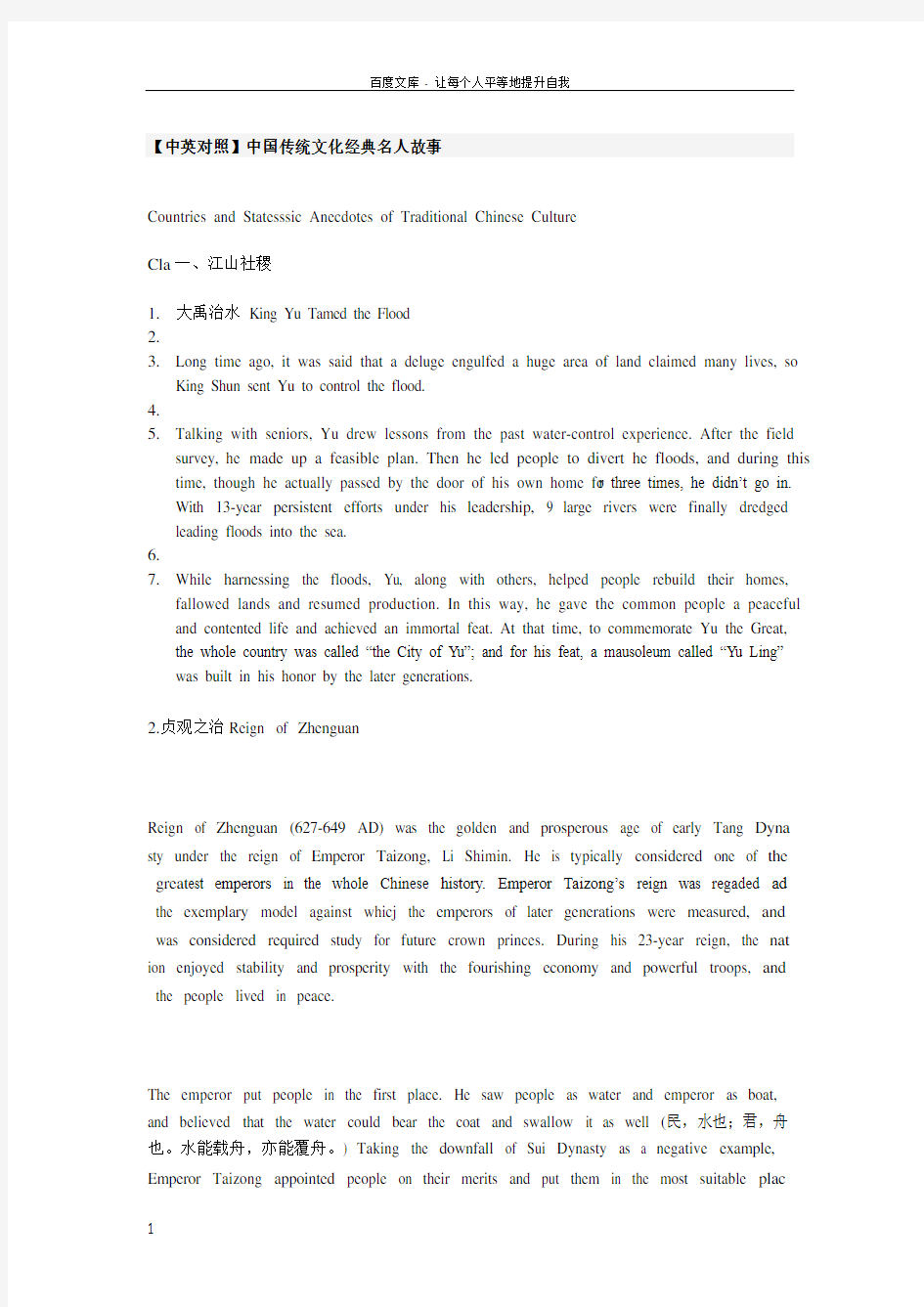

【中英对照】中国传统文化经典名人故事
Countries and Statesssic Anecdotes of Traditional Chinese Culture
Cla一、江山社稷
1.大禹治水King Yu Tamed the Flood
2.
3.Long time ago, it was said that a deluge engulfed a huge area of land claimed many lives, so
King Shun sent Yu to control the flood.
4.
5.Talking with seniors, Yu drew lessons from the past water-control experience. After the field
survey, he made up a feasible plan. Then he led people to divert he floods, and during this time, though he actually passed by the door of his own home fo r three times, he didn’t go in.
With 13-year persistent efforts under his leadership, 9 large rivers were finally dredged leading floods into the sea.
6.
7.While harnessing the floods, Yu, along with others, helped people rebuild their homes,
fallowed lands and resumed production. In this way, he gave the common people a peaceful and contented life and achieved an immortal feat. At that time, to commemorate Yu the Great, the whole country was called “the City of Yu”; and for his feat, a mausoleum called “Yu Ling”
was built in his honor by the later generations.
2.贞观之治Reign of Zhenguan
Reign of Zhenguan (627-649 AD) was the golden and prosperous age of early Tang Dyna sty under the reign of Emperor Taizong, Li Shimin. He is typically considered one of the great est emperors in the whole Chinese history. Emperor Taizong’s reign was regaded ad the exemplary model against whicj the emperors of later generations were measured, and was considered required study for future crown princes. During his 23-year reign, the nat ion enjoyed stability and prosperity with the fourishing economy and powerful troops, and the people lived in peace.
The emperor put people in the first place. He saw people as water and emperor as boat, and believed that the water could bear the coat and swallow it as well (民,水也;君,舟也。水能载舟,亦能覆舟。) Taking the downfall of Sui Dynasty as a negative example, Emperor Taizong appointed people on their merits and put them in the most suitable plac
e, besides, he encouraged the free airing of views, accepted criticism with modesty and ga ve important position to the capable chancellors such as 房玄龄、杜如晦和魏征and so on. He made a peaceful society by takibg a series of policies, such as putting great emphasi s on agriculture, cutting taxes upon farmers, taking the policy of recuperation and strictly enforcing thrift.
Because his era name was Zhenguan, the grand times under his rule was generally recogn ized as Reign of Zhenguan, which laid a solid foundation for the peace and prosperity of later Tang Dynasty.
After a long time deposition, feudal china ushered on the age of integration in such fields as politics, economy and culture during the 60-year reign of Emperor
Qianlong.
3. Sleeping on Brushwood and Tasting Gall 卧薪尝胆
In the Spring and Autumn Period, the State of Wu defeated the State of Y ue, and took the King Gou Jian and his wife prisoner. For several years, Gou Jian laboured as salve in Wu. When he was released and returned to Yue, Gou Jian was determined to take revenge for losing his state. In order that he would nec\ver forget his humiliation, Gou Jian slept on a pie of brushwood and tasted gall before every meal in order to remind him of the shame and revenge. After ten years of careful preparations, he attacked and finally conquered the State of Wu.
This idiom is used to describe inspiring oneself to accomplish an ambition.
春秋战国时代,越国被吴国打败,越往勾践和妻子雅鱼被俘虏,咋吴国做了几年奴役。后来勾践被放回越国,他立志要要报亡国之仇。从此每天夜里睡在稻草上,每天吃饭前吃一个苦胆,以提醒自己不忘记过去的耻辱和仇恨。经过十年艰苦奋斗,越过终于雪耻战胜吴国。
4.Jing Ke Assassinated the King of Qin 荆轲刺秦
During the warring States Periods, the Prince of Yan sent a famous assassinator Jing K
e to kill the King o
f Qin.
Jing Ke, together with another warrior,left for Qin with the head of 樊於期,a defector of Qin and the map of 督康,the most fertile land of Yan. Approaching the River Yi, Jing Ke sung a heartbroken song impassionedly, “ the River Yi is cold as the wind bl
ows , the hero will never return after this departure.”
Knowing that the envoy from yan brought both the head of 樊於期and the map of督康,the King of Qin felt very happy and ordered to meet Jing Ke at Xianyang Palac
e right away. Seeing the king, Jing Ke talked with ease. He handed the map to the ki
ng. No sooner had the king fully unrolled the map than Jing Ke took out the dagger h idden in the map and grabbed the king’s sleeve trying to stab him. The king tore the s leeve and jumped by the nearby screen heading out. Nobody could do anything to hel
p. (难道都看傻眼了吗?汗⊙﹏⊙) The king managed to pull out his long sword and chopped off the left leg of Jing Ke who finally died at Qin’s palace.
Though the assassination failed, Jing Ke took his place in the history book forever due to his bravery
战国时期,燕国太子丹派著名刺客荆轲前往刺杀秦王。
荆轲与另一勇士一起,带着秦国叛将樊於期的头颅和燕国最肥沃的土地督康地图向秦国出发。临近易水,荆轲慷慨悲歌:风萧萧兮易水寒,壮士一去兮不复返。
秦王听说燕使者把叛将的头颅的督康的地图送了了,于是很高兴,立即下令在咸阳宫接见荆轲。一见秦王,荆轲谈笑自若,在将地图献给秦始皇时,趁始皇展开地图之际,荆轲抽出藏在图中的匕首一把打着始皇衣袖,向他刺去。始皇扯断衣袖(
楼主其实并不解,皇帝衣服材料应该很好吧,怎么一扯能断?当真神力啊还是衣料不好啊?),跳过旁边的屏风往外跑。众人却毫无办法(朝堂上都是文官)秦王好不容易拔出长剑,将荆轲左腿砍断,杀死在殿上。
荆轲虽然行刺失败,但荆轲却因自己的英勇而被永载史册。(明知不可为而为之~~)